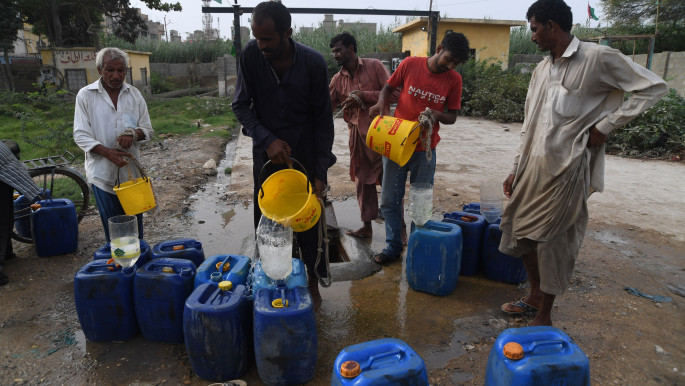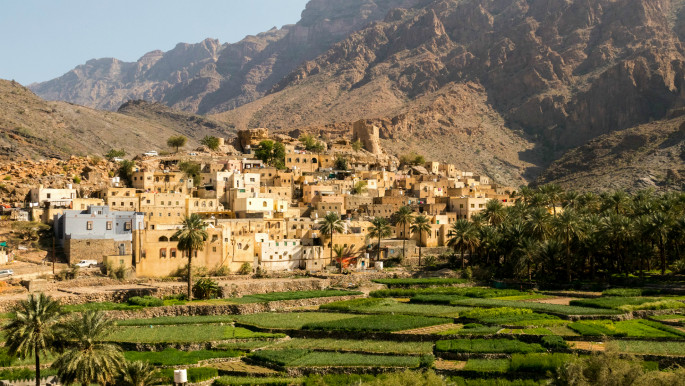Pakistan could run out of water by 2025. Here's how
"Water scarcity represents a major threat to Pakistan's future stability, both in domestic and regional contexts," said Michael Kugelman, senior associate for South Asia at the Woodrow Wilson International Center for Scholars and an editor of Running on Empty: Pakistan's Water Crisis.
As a country with a population of over two hundred million, Pakistan consumes significant amounts of water. In fact, the South Asian country has the fourth-largest water footprint in the world. The Indus River, one of the longest in Asia, fulfills much of that need for Pakistanis, but the river can only do so much before Pakistanis find themselves on the brink of a humanitarian crisis.
"Given that the majority of the country continues to depend on agriculture and irrigation for its economic stability, an unstable water supply could pose a significant threat to millions," Dr Haider Warraich, a fellow at Duke University Medical Center, told The New Arab.
"The supply of clean drinking water is also very important, given how essential it is to the control of infectious disease."
In June 2015, the International Monetary Fund, or IMF, issued the landmark report Issues in Managing Water Challenges: Regional Perspectives and Case Studies. The IMF observed that population growth had far outpaced water supply in Pakistan, contributing to water scarcity in a country with what the authors called "the world's largest irrigation system."
 |
The IMF observed that population growth had far outpaced water supply in Pakistan, contributing to water scarcity in a country with what the authors called 'the world's largest irrigation system' |  |
The IMF posited that further challenges might arise from the South Asian country's aging infrastructure, which could affect water quality.
That same month, the National Aeronautics and Space Administration, or NASA, an American government agency, spearheaded a study of aquifers across the world. The NASA study noted that an aquifer on which India and Pakistan depended had become "the second most stressed" in the world. Only the Arabian Aquifer System, located in the middle of a desert, was suffering from greater stress.
"Islamabad frequently accuses New Delhi of building dams that block water from flowing into Pakistan," Kugelman told The New Arab.
"In reality, Pakistan's water shortages have more to do with climate change and bad policy than with Indian actions. But the grievances will intensify and the accusations will grow louder as Pakistan's water problems intensify."
In November 2017, the Asia Foundation called on Pakistan to implement "a national water policy," echoing the concerns of the IMF, NASA, and non-government organisations.
"Increasing population, stagnating food production, and environmental degradation are major catalysts for rising food insecurity in Pakistan," said Ahmad Naeem Salik, a research fellow at the Institute of Strategic Studies Islamabad who specialises in climate change mitigation.
"The water-related environmental challenges arising out of shrinking glaciers, soil erosion, groundwater degradation, pollution, and transboundary issues causing water scarcity are of major concern for policymakers."
As inter-governmental and international non-governmental organisations continued to sound the alarm, the problem was only growing worse. The Indus River System Authority, a Pakistani government agency, admitted earlier this year that water scarcity remained severe and was having a significant effect on irrigation.
Meanwhile, many Pakistanis in cities as large as Karachi were rationing water. The Twitter account Pakistan Water Crisis began documenting Pakistan's challenges with water security.
 |
|
| Pakistani residents filling their containers with water in Karachi [Getty] |
"People with power have more than they know what to do with, and people without power don't have enough to survive," said Dr Daanish Mustafa, a reader in human geography at King's College London who studies climate risk, environmental hazards, and water resources.
The Pakistani Council of Research in Water Resources, or PCRWR, an offshoot of the Pakistani Science and Technology Ministry, warned that Pakistan could run out of water by 2025.
The PCRWR added that the South Asian country had already reached the "water stress line" in 1990 and the "water scarcity line" in 2005 but that Pakistan had ignored the warning signs. Pakistan will likely have to find a solution in the next seven years if it wants to avoid an all but inevitable humanitarian crisis.
 |
Pakistan will likely have to find a solution in the next seven years if it wants to avoid an all but inevitable humanitarian crisis |  |
"As long as the country keeps pretending that it can somehow build infrastructure out of its problems, it won't be able to solve anything," Mustafa told The New Arab.
Environmentalists in Pakistan could take several approaches to water scarcity and interconnected environmental issues, including the broader challenge of climate change.
"Pakistan's best bet for easing its water distress is to undertake policy reforms that encourage more judicious use of water," said Kugelman.
"Islamabad can also ramp up efforts to raise awareness within society about how to be better about conserving water."
In addition to taking practical steps to conserve water, Pakistan could request assistance from the the Asia Foundation, the IMF, NASA, and other international NGOs, intergovernmental organisations, and foreign government agencies.
 |
|
| Read also: A green future: Oman blazes a trail for environmentalism in the Arab world |
The United Nations Development Programme and the UN Environmental Programme also seem well positioned to help Pakistan overcome challenges with water conservation.
"If water, energy, and food security are to be simultaneously achieved in Pakistan, decision-makers, including those responsible for only a single sector, need to consider broader influences and cross-sectoral impacts," Salik told The New Arab.
"A nexus approach to sectoral management, through enhanced dialogue, collaboration, and coordination, is needed to ensure that co-benefits and tradeoffs are considered and that appropriate safeguards are put in place."
Pakistani officials might even look at how other countries have chosen to tackle environmental issues. Some officials in the United States Department of Defense have begun considering climate change a threat to national security.
Many Indonesian activists, clerics, and gurus, meanwhile, are portraying environmental protection as a religious obligation for all Muslims. Some combination of the American and Indonesian examples would likely work best for Pakistan, a Muslim-majority country with a popular military. Either approach could mobilise civil society, a critical part of any environmental policy.
"To be sure, there's only so much that can be done, as Pakistan can't exactly reverse climate change and its problematic effects," observed Kugelman.
"But making changes on policy levels and on the level of social awareness can be helpful and mitigate the future shocks of water scarcity."
Whichever path Pakistanis choose, they must do so fast. While India and al-Qaeda dominate the headlines of newspapers across the globe, water scarcity looms large in the minds of Pakistanis.
"As long as the priority is going to be the ability of the rich and the powerful to become richer and more powerful, Pakistan is going to have the type of problems that it has," said Mustafa.
Austin Bodetti studies the intersection of Islam, culture, and politics in Africa and Asia.
He has conducted fieldwork in Bosnia, Indonesia, Iraq, Myanmar, Nicaragua, Oman, South Sudan, Thailand, and Uganda. His research has appeared in The Daily Beast, USA Today, Vox, and Wired.







 Follow the Middle East's top stories in English at The New Arab on Google News
Follow the Middle East's top stories in English at The New Arab on Google News


